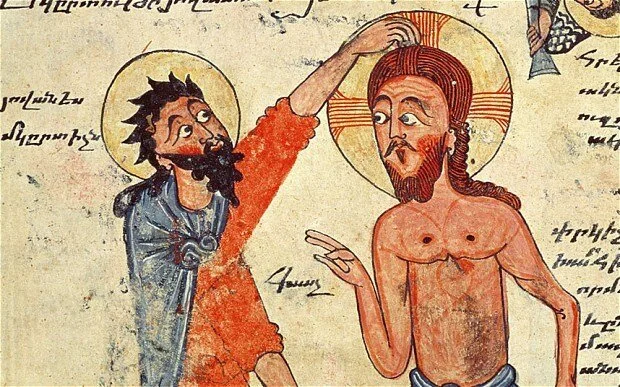Catholicity is not an option. It is the only reality. For either Baptist churches are expressions of the church catholic, or they are not the church at all (Curtis Freeman).
“We are neither Protestants nor Catholics. We are Baptists.” From their separatist beginnings, Baptists have always teetered on the edge of denominational exclusivism.
From the mid-19th century Landmarkist movement to the Southern Baptist Convention today, many Baptists have conceived of their tradition, either implicitly or explicitly, as the only valid form of Christian orthodoxy. Such exclusivism permeates various strands of modern Christianity but it is especially pronounced, I would say, among Baptists.
As Curtis Freeman and others have noted, however, “The ecumenical movement [by which various denominations engage in dialogue, service, and worship together] is arguably the single most significant development for the church in the twentieth century. Yet remarkably the largest Protestant denomination (SBC) is not a participant.”
While the SBC isn’t representative of all Baptist denominations (i.e., ABC-USA has engaged in ecumenical dialogue since the 1960s), their recent denominational isolationism highlights a prominent trait among Baptists throughout history.
The Protestant Reformation, intended to reform (not replace) the time-tested holy Roman church, led to the rise of various Christian denominations, many of which became established, state-sanctioned institutions. Baptists began their existence then as protesters against the protesters, not in a double-negative-equals-a-positive (pro-Rome) sense, but in a radical, separatist sense.
Over time, Baptists –characterized by believer’s baptism, freedom of the soul, separation of church and state, and local church autonomy– left Holland and the British Isles in search of religious freedom in the New World. And if Roger Williams is any indication, Baptists wasted no time resisting the religious establishment of the early American colonies (i.e., Congregationalism).
At their best Baptists have been champions of religious freedom, unmediated and uncoerced faith, and local, congregational autonomy as opposed to institutional hierarchy. At their worst, however, Baptists have been isolationist and anti-catholic, ‘catholic’ in both the uppercase sense –Roman Catholic– and the lowercase sense –universal, ecumenical, interdenominational.
On this topic, Curtis Freeman has written a riveting book entitled, Contesting Catholicity: Theology for Other Baptists. Freeman, an ordained Baptist minister and Professor of Theology and Baptist Studies at Duke Divinity School, combs painstakingly through Baptist history, showing that isolationism is not characteristic of all Baptists. There have been “other Baptists” throughout each generation of Baptist history, he argues, who have retained their Baptist identity while locating themselves within the church catholic.
Freeman engages in rigorous historical retrieval not out of mere academic curiosity but ecclesiological necessity. He writes: “The categorical rejection of all things catholic,” and I would say: all things ecumenical (or other-than-Baptist), “risks a loss not simply of the catholic [universal, common] substance of the faith but of its Christian substance as well.”
“Either Baptist churches are expressions of the church catholic, or they are not the church at all,” Freeman writes. For some Baptists then, catholicity is not an option to either accept or reject. It is the only authentic reality for followers of Jesus today.
Citing a decree from the Roman Catholic Church’s Second Vatican Council in 1964, Freeman writes, “the lack of accord among followers of Jesus ‘contradicts the will of Christ, scandalizes the world, and damages the cause of preaching the Gospel to every creature.’” It’s no wonder then, that immediately following Vatican II, ABC-USA entered into ecumenical dialogue with Roman Catholic officials. And what did they find? Baptists and Catholics have much more in common than they thought.
If Baptists and Roman Catholics have so much in common, how much more Baptists and catholics (other Christian denominations)? What might it look like for Baptists to view themselves not as a sectarian community of authentics but as a “reforming communing of contesting Christians” within the global, catholic church?
Freeman’s book charts a course, and I’d encourage any and all Baptists to follow it. But the answer lies not in reinventing the faith anew but in retrieving the faith of our ancient forebears.
Reading the Apostolic Fathers, studying the history of the global church, engaging in dialogue with other traditions, are all possible ways to adopt this vision. “Other Baptists,” Freeman concludes, “are contesting catholics.”
Baptists are not the only true believers descended in unbroken lineage from John the Baptist and Jesus Christ. They’re not the only authentic, orthodox Christians, no. Baptists are peculiar Protestants located within the global, universal church, who cannot afford (especially now) to forget their catholicity.
The world today, in sum, sees a church that is fragmented, disconnected, and divided. What better witness to the unifying heart of Jesus than if Baptists became a little more catholic.
Jonah Bissell
Pastor

